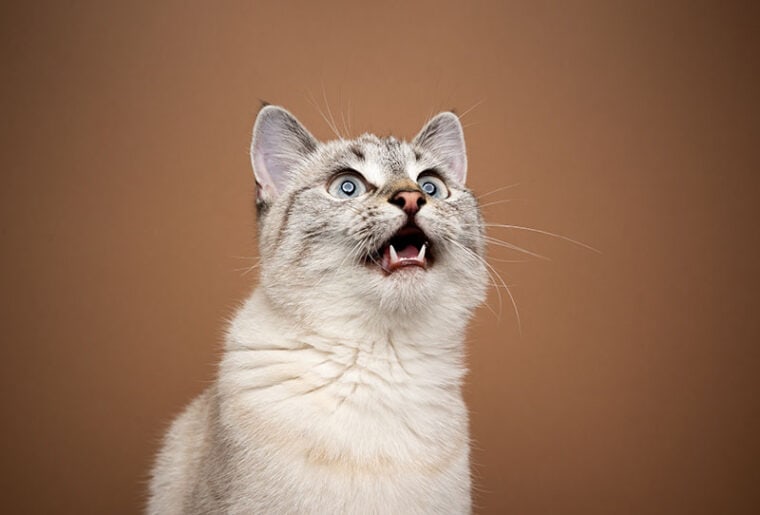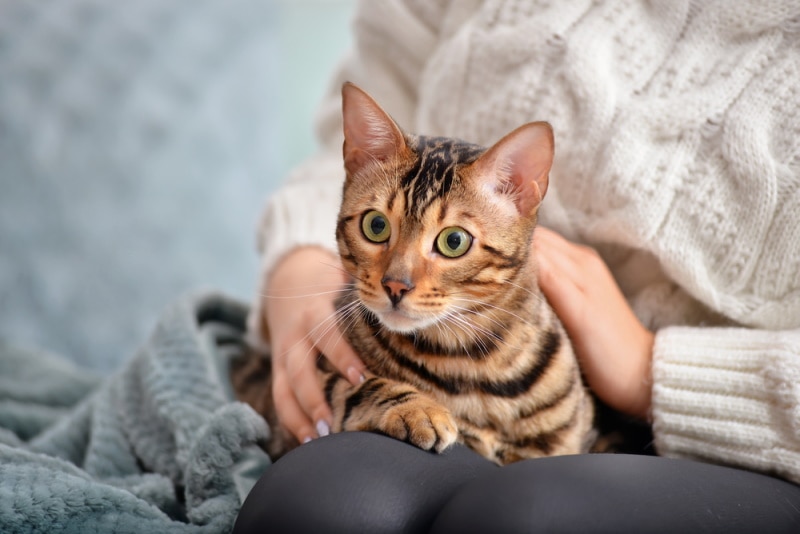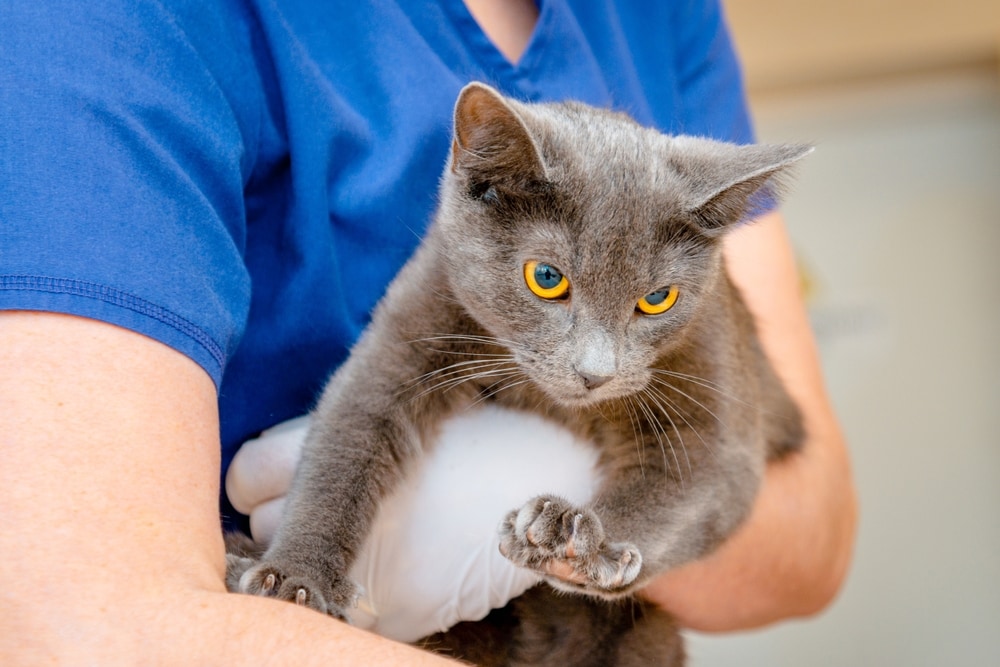
Click to Skip Ahead
The question of whether cats can see ghosts and spirits has intrigued pet owners and paranormal enthusiasts alike for centuries. While there’s no definitive scientific evidence to prove that cats can see ghosts, certain behaviors exhibited by cats have led some to believe they might be perceiving something beyond human sensory capabilities. These behaviors include staring at seemingly nothing or acting strangely in specific spots. Let’s learn more about a cat’s senses in this article.
Cats’ Extraordinary Senses
Cats, being natural predators, have evolved with sensory capabilities far more advanced than those of humans. These extraordinary senses not only make them exceptional hunters, but also fuel speculations about their ability to perceive things beyond human understanding.
Night Vision
Cats are known for their remarkable night vision. Their eyes have a high concentration of rod cells, which are more sensitive to light and motion than cone cells. This allows them to see clearly in nearly total darkness. Additionally, cats have a layer of cells in their eyes called the tapetum lucidum, which reflects light back through the retina and enhances their night vision. This could possibly explain why cats often seem to stare intently into seemingly empty spaces or dark corners, leading some to speculate they’re seeing entities invisible to human eyes.

Hearing Range
Cats also possess an impressive range of hearing. They can detect ultrasonic sounds—those frequencies higher than what the human ear can perceive. This acute hearing helps cats hunt, as many rodents communicate using ultrasonic calls. This could also account for instances when cats appear to respond to sounds or voices that humans can’t hear, which can sometimes be interpreted as interactions with unseen entities.
Sensory Whiskers
A cat’s whiskers, or vibrissae, are another amazing sensory tool. These are not just ordinary hairs but highly sensitive touch receptors. Whiskers can detect minute changes in air currents and vibrations in the environment, helping cats navigate their surroundings, even in complete darkness. This sensitivity to subtle environmental changes might lead cats to react to stimuli that humans aren’t aware of, giving the impression that they’re sensing spectral presences. While it’s a fascinating theory, there’s currently no scientific evidence to support this claim.
Cat Behaviors and the Paranormal
Certain cat behaviors have often been associated with the perception of ghosts or spirits. While these behaviors can usually be attributed to natural instincts or responses to stimuli, they have fueled speculations about cats’ ability to perceive supernatural entities.
Staring at Empty Spaces
Cats are known for their tendency to stare intently at what seems to us as empty space. This could be due to their superior vision that allows them to spot tiny movements or changes in light that humans can’t detect. However, some interpret this behavior as an indication that cats are seeing spirits or entities that are invisible to human eyes.

Acting Spooked for No Apparent Reason
There are times when cats might suddenly act spooked, appearing to react to something invisible. They might hiss, arch their back, puff up their fur, or suddenly dart off. While this is often just normal cat behavior triggered by stimuli that humans can’t perceive, some attribute it to encounters with ghostly presences.
Avoiding Certain Areas
If a cat avoids a particular area in your home, some might suggest it’s because they sense a spirit there. However, it’s more likely to be due to a smell, sound, or a negative past experience associated with that area.
Sudden Changes in Behavior
Cats are creatures of habit, and sudden changes in behavior can be alarming. If a usually friendly cat suddenly becomes withdrawn, or an independent cat becomes clingy, some might attribute these changes to the presence of a ghost. However, it’s essential to rule out any health issues first, as changes in behavior can be a sign of illness in cats.

Unexplained Aggression
Unexplained aggression, such as hissing, growling, or swatting at seemingly nothing, can sometimes be interpreted as a reaction to a supernatural entity. It’s crucial to remember, though, that cats can react this way to a variety of stimuli, including sounds, smells, or even discomfort or pain.
Focused Attention on Certain Objects
Sometimes, cats appear to focus their attention on certain objects, such as a specific spot on a wall or a seemingly random point in space. While this could be due to them spotting a tiny insect or hearing sounds within the wall, some interpret it as a sign that the cat is seeing or sensing a spirit.
Scientific Perspective
From a scientific standpoint, there’s currently no evidence to support the idea that cats can see ghosts or spirits. Many behaviors interpreted as reactions to the paranormal can usually be explained by a cat’s natural instincts or responses to stimuli that humans aren’t aware of.
Are Ghosts Real?
The existence of ghosts has been a topic of debate for centuries. While there’s no concrete scientific evidence to prove their existence, countless personal anecdotes and cultural beliefs worldwide suggest the possibility of their presence.
From a scientific perspective, there’s currently no empirical evidence to support the existence of ghosts. Scientists generally attribute reports of ghost sightings to natural phenomena or psychological factors.
Natural Phenomena
Many supposed paranormal occurrences can often be explained by natural phenomena. For instance, infrasound—sound at frequencies too low for humans to hear—can cause feelings of unease or dread and is sometimes present in places reputed to be haunted.

Psychological Factors
Psychologists suggest that belief in ghosts can be influenced by several factors, including suggestion, expectation, and the power of the human brain to see patterns (pareidolia) or fill in information based on past experiences (apophenia).
Despite the lack of scientific proof, many people claim to have experienced ghostly encounters. These range from feeling an unexplained cold chill to seeing apparitions or hearing voices.
Cultural Beliefs
Cultural beliefs about ghosts vary widely around the world, but many cultures do have concepts of spirits or entities that survive after death.
While the existence of ghosts remains unproven and largely a matter of personal belief, it’s a topic that continues to fascinate and provoke discussion. Whether or not ghosts are real, stories about them certainly have a real impact on our culture and our individual psyches.
Frequently Asked Questions
Do cats have a sixth sense?
While it’s often said that cats have a “sixth sense,” this generally refers to their heightened physical senses and instincts, not a supernatural ability.
Why does my cat stare at walls?
Cats may stare at walls due to a variety of reasons, such as spotting tiny insects, hearing sounds within the wall, or responding to changes in light or shadow.
Can cats sense death?
Some anecdotal reports suggest that cats may show unusual behavior when a family member is nearing death, but there is no scientific evidence to confirm this.

Do cats act differently in haunted houses?
There’s no scientific basis for defining a house as “haunted,” and thus no established way to determine if cats act differently in such environments.
Do all cultures believe cats can see spirits?
Beliefs about cats vary widely among different cultures. In some, cats are considered spiritual animals with connections to the afterlife, while others don’t attribute any supernatural abilities to them.
What do vets say about cats seeing ghosts?
Most veterinarians would likely attribute “ghost-seeing” behaviors to natural instincts or responses to unseen stimuli, rather than paranormal activity.

Conclusion
While it’s an intriguing idea, there’s currently no scientific evidence to support the claim that cats can see ghosts or spirits. The extraordinary senses of cats can lead them to behave in ways that humans find mysterious or unexplainable, leading to such beliefs. However, these behaviors are typically normal responses to stimuli that are beyond human perception. As always, if your cat exhibits any behavior that concerns you, it’s best to consult with a veterinarian.
Featured Image Credit: Nils Jacobi, Shutterstock







